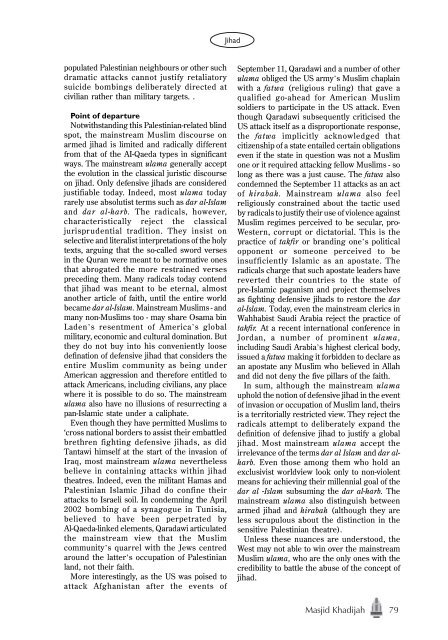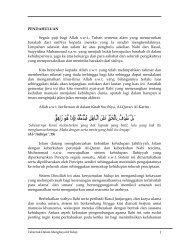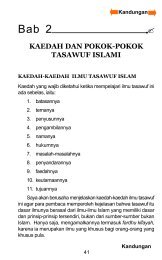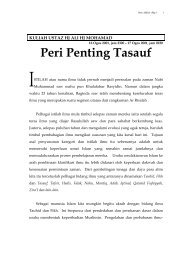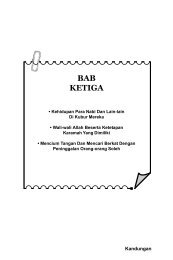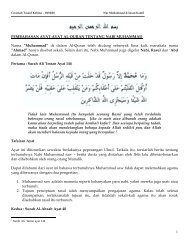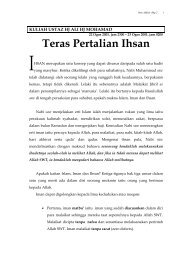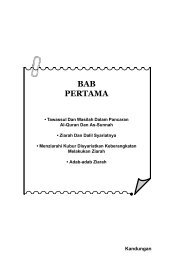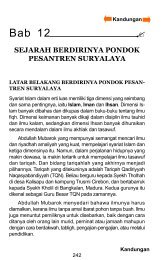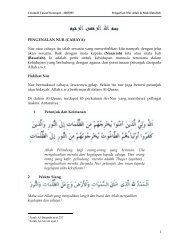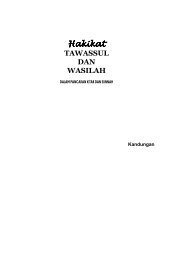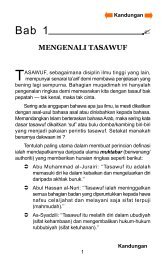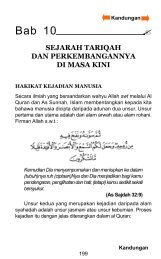Create successful ePaper yourself
Turn your PDF publications into a flip-book with our unique Google optimized e-Paper software.
Jihadpopulated Palestinian neighbours or other suchdramatic attacks cannot justify retaliatorysuicide bombings deliberately directed atcivilian rather than military targets. .Point of departureNotwithstanding this Palestinian-related blindspot, the mainstream Muslim discourse onarmed <strong>jihad</strong> is limited and radically differentfrom that of the AI-Qaeda types in significantways. The mainstream ulama generally acceptthe evolution in the classical juristic discourseon <strong>jihad</strong>. Only defensive <strong>jihad</strong>s are consideredjustifiable today. Indeed, most ulama todayrarely use absolutist terms such as dar al-Islamand dar al-harb. The radicals, however,characteristically reject the classicaljurisprudential tradition. They insist onselective and literalist interpretations of the holytexts, arguing that the so-called sword versesin the Quran were meant to be normative onesthat abrogated the more restrained versespreceding them. Many radicals today contendthat <strong>jihad</strong> was meant to be eternal, almostanother article of faith, until the entire worldbecame dar al-Islam. Mainstream Muslims - andmany non-Muslims too - may share Osama binLaden’s resentment of America’s globalmilitary, economic and cultural domination. Butthey do not buy into his conveniently loosedefination of defensive <strong>jihad</strong> that considers theentire Muslim community as being underAmerican aggression and therefore entitled toattack Americans, including civilians, any placewhere it is possible to do so. The mainstreamulama also have no illusions of resurrecting apan-Islamic state under a caliphate.Even though they have permitted Muslims to‘cross national borders to assist their embattledbrethren fighting defensive <strong>jihad</strong>s, as didTantawi himself at the start of the invasion ofIraq, most mainstream ulama neverthelessbelieve in containing attacks within <strong>jihad</strong>theatres. Indeed, even the militant Hamas andPalestinian Islamic Jihad do confine theirattacks to Israeli soil. In condemning the April2002 bombing of a synagogue in Tunisia,believed to have been perpetrated byAl-Qaeda-linked elements, Qaradawi articulatedthe mainstream view that the Muslimcommunity’s quarrel with the Jews centredaround the latter’s occupation of Palestinianland, not their faith.More interestingly, as the US was poised toattack Afghanistan after the events ofSeptember 11, Qaradawi and a number of otherulama obliged the US army’s Muslim chaplainwith a fatwa (religious ruling) that gave aqualified go-ahead for American Muslimsoldiers to participate in the US attack. Eventhough Qaradawi subsequently criticised theUS attack itself as a disproportionate response,the fatwa implicitly acknowledged thatcitizenship of a state entailed certain obligationseven if the state in question was not a Muslimone or it required attacking fellow Muslims - solong as there was a just cause. The fatwa alsocondemned the September 11 attacks as an actof hirabah. Mainstream ulama also feelreligiously constrained about the tactic usedby radicals to justify their use of violence againstMuslim regimes perceived to be secular, pro-Western, corrupt or dictatorial. This is thepractice of takfir or branding one’s politicalopponent or someone perceived to beinsufficiently Islamic as an apostate. Theradicals charge that such apostate leaders havereverted their countries to the state ofpre-Islamic paganism and project themselvesas fighting defensive <strong>jihad</strong>s to restore the daral-Islam. Today, even the mainstream clerics inWahhabist Saudi Arabia reject the practice oftakfir. At a recent international conference inJordan, a number of prominent ulama,including Saudi Arabia’s highest clerical body,issued a fatwa making it forbidden to declare asan apostate any Muslim who believed in Allahand did not deny the five pillars of the faith.In sum, although the mainstream ulamauphold the notion of defensive <strong>jihad</strong> in the eventof invasion or occupation of Muslim land, theirsis a territorially restricted view. They reject theradicals attempt to deliberately expand thedefinition of defensive <strong>jihad</strong> to justify a global<strong>jihad</strong>. Most mainstream ulama accept theirrelevance of the terms dar al Islam and dar alharb.Even those among them who hold anexclusivist worldview look only to non-violentmeans for achieving their millennial goal of thedar al -Islam subsuming the dar al-harb. Themainstream ulama also distinguish betweenarmed <strong>jihad</strong> and hirabah (although they areless scrupulous about the distinction in thesensitive Palestinian theatre).Unless these nuances are understood, theWest may not able to win over the mainstreamMuslim ulama, who are the only ones with thecredibility to battle the abuse of the concept of<strong>jihad</strong>.Masjid <strong>Khadijah</strong> 79


